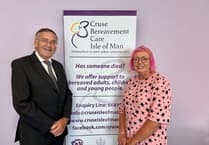At last month’s Isle of Man Newspapers Awards for Excellence, one acceptance speech stole the show. It wasn’t anything to do with success in business and it didn’t come from any of our captains of industry as you might have expected.
This speech came from Sylvia and Les Lawrinson, the married couple who jointly won the award for Volunteer of the Year.
They won it for the nearly 90 years of combined service to the Samaritans that they have completed between them but that has been by no means their only contribution to their local community, as I soon discovered when I went to talk to them at their home on Douglas’ South Quay.
Sylvia and Les first joined the Samaritans in 1971, when they lived in Barrow.
At the time Les was working as an electronics engineer in the shipbuilding industry.
Sylvia tells me that she was ’mostly a stay at home mum’, looking after their three children, Mike, Steve and Jan.
Then she adds, almost as an aside: ’Because we did a lot of fostering as well.
’We had something like 70-odd foster children. There was always a full house.’
Les adds with a smile: ’It was always a surprise to come in from work and see a new face - through after a while it stopped being a surprise.’
At the same time as fostering Sylvia also found the time to volunteer for her local Samaritans branch, with Les joining her there a few years later.
They spent 12 years taking calls there before moving to the Isle of Man in 1983.
Although their lives had changed with Les now working as manager of the government training centre at Hills Meadow, they found they missed the Samaritans and they joined the Isle of Man branch in 1985.
And just to show that they really can’t stop themselves from helping people, Sylvia went on: ’When we retired Les got ordained. He became a minister and I left him!
’I went to Romania to work for three months. I went out to do childcare in a children’s hospice, looking after AIDS and HIV positive babies and children up to around nine years of age, There were very, very few parents about - I think you could probably count them on the fingers of one hand - and some of the babies had never been out of their cots.
’It was very sad. I went out for three months the first time and then went back for a couple of one month stints and then Les came too.’
Back on the island, Les was made curate at St Peter’s in Onchan then an assistant minister at St George’s but he has now retired completely.
Their work with the Samaritans continues and Sylvia reflected on how it has changed since they first joined so many years ago.
Sylva said: ’It’s very different now. Then it was either somebody coming in to see you face to face or it was somebody on the phone.
’Now we still have those but we have texts and emails from callers as well and I don’t really know which ones give you the most satisfaction.’
Les added: ’Face to face interviews are the most difficult in their way because you never know quite what’s coming at you or what they expect from you.’
Sylvia agreed: ’People must be pretty desparate to call in, especially on such a small island with the possibility that someone might know you.
’But sometimes when things are so bad for them it doesn’t really matter to them if they do know you. I think it’s very hard nowadays for some people to find somebody to talk to - everybody’s so busy now aren’t they?’
That sums up the whole ethos of the Samaritans. It is a listening service. The volunteers are non-judgemental and volunteers do not offer advice.
’The dreaded words which of course you can think but you can never say are: "If I were you..."’ said Les.
As well as answerings calls, Les and Syliva are both on team in charge of the selection of new volunteers whom they also mentor.
In addition to this they are part of a small tram of Samaritans volunteers who visit the prison once a month, offering their service to the inmates.
They have become so accepted there that they are allowed onto the wings and can go into prisoners’ cells to talk with them though they add that they always wait to be invited in.
Les said: ’Initially the prisoners were a bit suspicious but now they got used to the idea. We’re a different face and they welcome that.’
Sylvia added: ’A lot of them have got families on the outside that they worry about as well as finding work or somewhere to live when they come out. We can’t do anything about providing these things but we can listen
’We’re not bothered about what they’ve done. We can talk in depth to someone and we come out and we still haven’t a clue why they’re in there. And it doesn’t matter to us anyway.’
As volunteers who have spent so long with the Samaritans, I asked them what would be on their wishlist for the organisation right now.
Sylvia said: ’We do need volunteers, our numbers are low now, and we need them for different things.
Perhaps if they don’t feel they could answer the phone they could do something else for us. We are always looking for people to help with publicity and outreach.’
And, after nearly 90 years of service between them can they ever envisage a time when they will stop helping others?
Les smiles and says: ’Why change the habit of a lifetime?’
â?¢ For more information see www.samaritans.org/branches/samaritans-isle-man


.png?width=209&height=140&crop=209:145,smart&quality=75)


This article has no comments yet. Be the first to leave a comment.